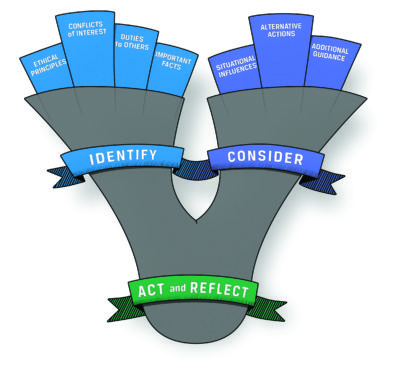Ethics in Practice: Just Building Client Relationships? Case for Week of 28 May and Analysis
How did you do analyzing this week’s case? The analysis is now available below.
Firms are always looking for ways to build their client relationships. But when does building relationships become more than ordinary business and promotion. Read about the firm in this week’s case and then join the conversation to let us know whether the actions are appropriate or violate the CFA Institute Code of Ethics and Standards of Professional Conduct (Code and Standards)?
Case
Soto is a founding partner and CEO of JPA, a large wealth management firm with offices throughout the world. The firm has many global institutional clients that include state-owned entities run by government officials. In an effort to build client relationships, Soto initiates a “Client Internship Program” that allows clients to refer candidates for internships at JPA. Referrals from this program are considered for employment outside of the firm’s normal rigorous and competitive hiring process. The larger the JPA client, the more likely a referral from that client would be hired into a lucrative, career-building internship position. JPA hires more than 200 relatives and friends of the key executives of many JPA clients, including relatives and friends from many government agencies that JPA has investment banking or asset management relationships with. JPA generates more than $100 billion in revenue from these investments and uses the connections generated with these clients to assist other clients and navigate complicated regulatory landscapes. Soto’s actions in establishing the JPA “Client Internship Program” are
- appropriate because the internship program benefits clients.
- appropriate because the program is an incentive for clients that hire JPA, similar to discounted fees.
- appropriate because the program creates a mutually beneficial business relationship between JPA and its clients.
- a violation of the CFA Institute Code and Standards.
Analysis
This case related to CFA Institute Standard I(B): Independence and Objectivity, which states that CFA Institute members “must not offer, solicit, or accept any gift, benefit, compensation, or consideration that reasonably could be expected to compromise…another’s independence and objectivity.” JPA uses the internship opportunity to personally benefit the relatives and friends of certain key individuals, including government officials, with the intent to corruptly influence those decision-making officials and executives. So, response D is the correct choice because this practice is a violation of Standard I(B), and there are likely legal and regulatory provisions relating to anti-bribery, such as the US Foreign Corrupt Practices Act, that may be relevant depending on the legal regime(s) applicable to JPA.
Modest gifts and entertainment in the ordinary course of business may be acceptable in the context of promoting professional services. Similarly, firms may offer large or significant clients discounts or incentives commensurate with their position. But this does not extend to offering what amounts to bribes to individual executives or government officials to influence the hiring process or look favorably on investment transactions. In this case the benefits were not to JPA’s investment clients but were personal to the individual decision makers.
This case is based on a US SEC enforcement action from 2016.
Have an idea for a case for us to feature? Send it to us at [email protected].
More About the Ethics in Practice Series
Just as you need to practice to become proficient at playing a musical instrument, public speaking, or playing a sport, practicing assessing and analyzing situations and making ethical decisions develops your ethical decision-making skills. The Ethics in Practice series gives you an opportunity to “exercise” your ethical decision-making skills. Each week, we post a short vignette, drawn from real-world circumstances, regulatory cases, and CFA Institute Professional Conduct investigations, along with possible responses/actions. We then encourage you to assess the case using the CFA Institute Ethical Decision-Making Framework and through the lens of the CFA Institute Code of Ethics and Standards of Professional Conduct. Then join the conversation and let us know which of the choices you believe is the right one and explain why. Later in the week, we will post an analysis of the case and you can see how your response compares.
Image Credit: ©CFA Institute

